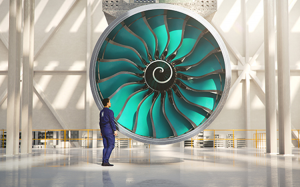Engineers at Rolls-Royce’s Bristol plant have started to make the world’s largest fan blades for the next generation of low-emission aero-engines.
As a set, the composite blades have a diameter of 140 inches – almost the size of a narrow -body aircraft fuselage. 
They are being manufactured in the Filton plant’s technology hub for the company’s UltraFan demonstrator engine, which will set new standards in efficiency and sustainability.
The milestone also marks the official start of production of parts for the demonstrator.
UltraFan will set new standards in efficiency and sustainability, says Rolls-Royce, reducing fuel by 25% compared to the first generation Trent engines while delivering the same percentage reduction in emissions.
Part of the improvement comes from UltraFan’s composite fan blades and fan case, which reduce weight on a twin-engine aircraft by 700kg – the equivalent of removing seven passengers.
Rolls-Royce president – civil aerospace Chris Cholerton said: “This is the decade of UltraFan and it’s exciting to enter the 2020s with the start of production of the demonstrator engine. We have got all the building blocks in place, the design, the technologies, a brand-new testbed, and now we are actually seeing the engine come together.”
UltraFan, which will start ground tests in 2021 and be available towards the end of this decade, is a scalable design from 25,000lb up to 100,000lb. It also features a new engine core architecture that delivers maximum fuel burn efficiency and low emissions, along with advanced ceramic matrix composites – heat-resistant components that operate more effectively in high turbine temperatures and a geared design to maximise high-thrust, high-bypass ratio engine efficiency.
Rolls-Royce sees UltraFan as a key element of its sustainability strategy, which involves continual research to improve gas turbine performance as well as pioneering electrification and working with industrial partners to accelerate the incorporation of sustainable aviation fuels.
It is also part of the Rolls-Royce IntelligentEngine vision, which brings together its products, services and digital technology.
The fan blades are created through the build-up of hundreds of layers of carbon-fibre materials, pre-filled with state-of-the-art, toughness-enhanced, resin material.
Heat and pressure are then applied, and each blade is finished with a thin titanium leading edge, which offers extreme protection against erosion, foreign objects and bird strikes.
Composite blades have already been extensively tested on an Advanced Low Pressure System (ALPS) development engine, including in-flight testing on the Rolls-Royce Flying Test Bed.
ALPS is a partnership between Rolls-Royce, Clean Sky, Innovate UK, BEIS, ATI, ITP Aero and GKN. The portfolio of technologies being developed to enable UltraFan is supported by ATI, Innovate UK, LuFo and Clean Sky 2.






























